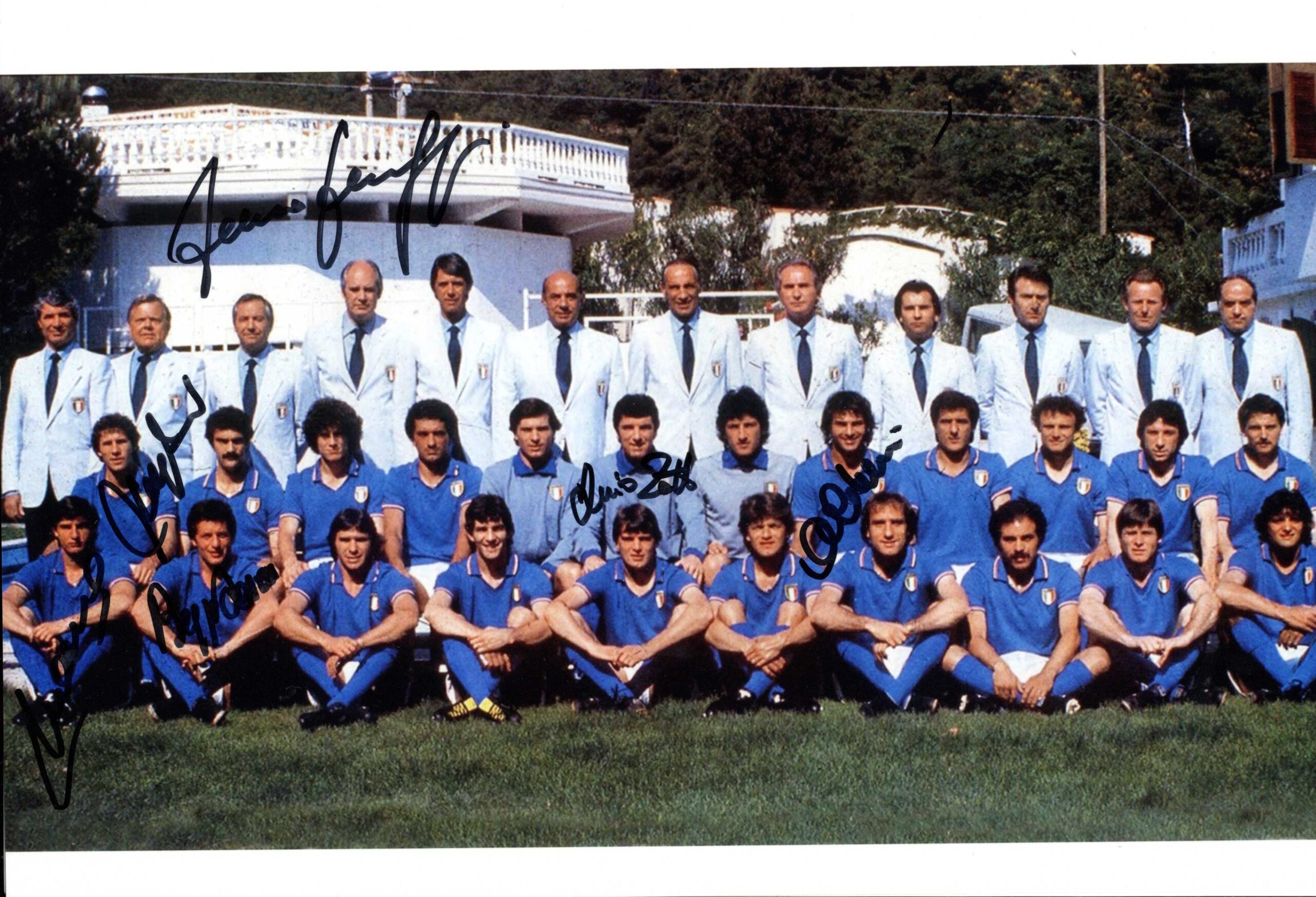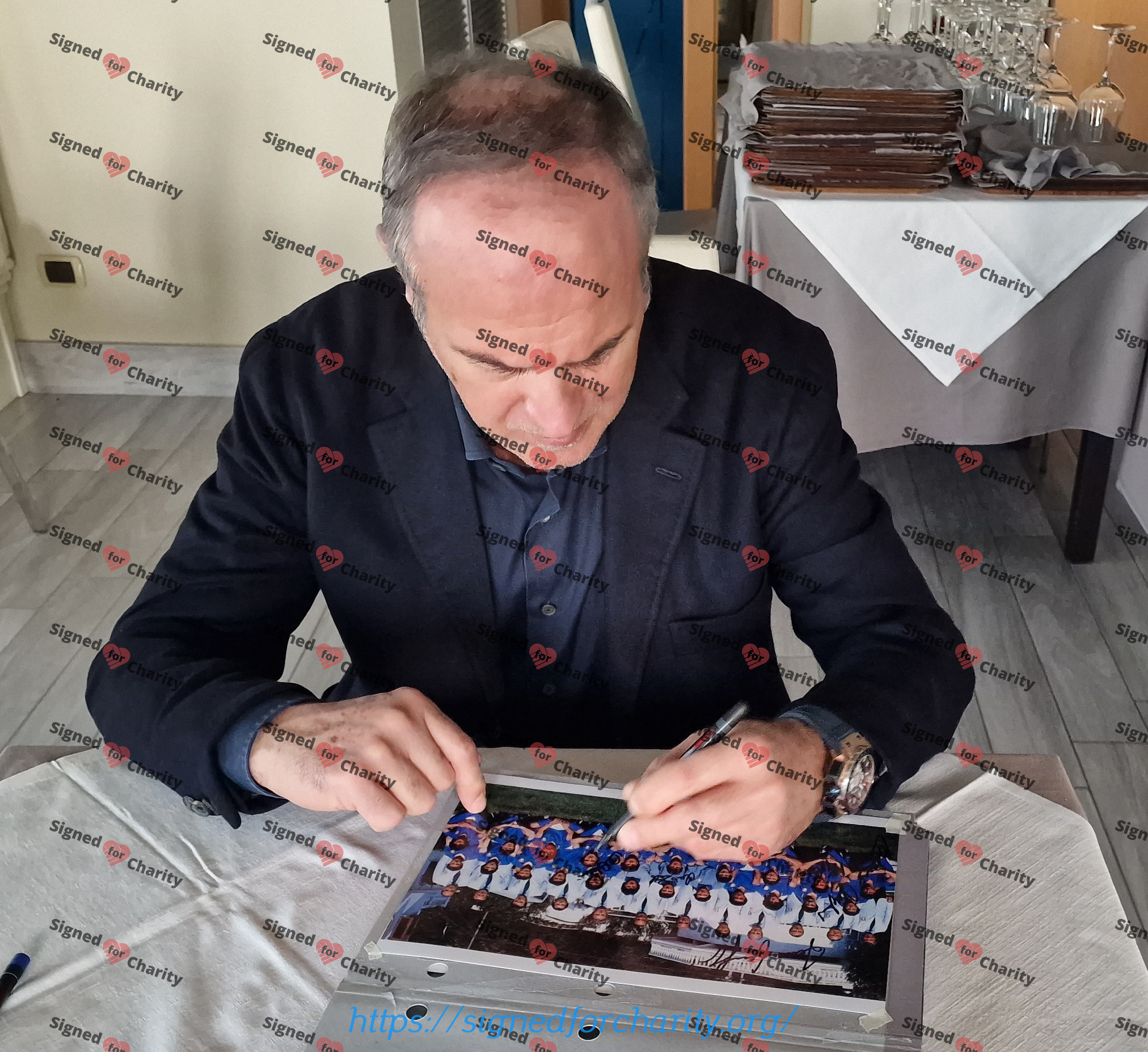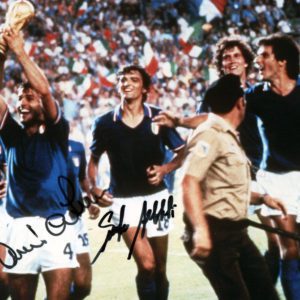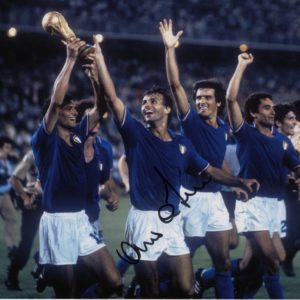Description
Antonio Cabrini (born 8 October 1957) is an Italian professional football manager and a former player. He has played left-back, mainly with Juventus. He won the 1982 FIFA World Cup with the Italian national team. Cabrini was nicknamed Bell’Antonio (“beautiful Antonio”), because of his popularity as a charismatic and good-looking football player. On the field, he made a name for himself as one of Italy’s greatest defenders ever, and is remembered in particular for forming one of the most formidable defensive units of all time with Italy and Juventus, alongside goalkeeper Dino Zoff, as well as defenders Claudio Gentile, and Gaetano Scirea. Cabrini won the Best Young Player Award at the 1978 World Cup, after helping Italy managed a fourth-place finish, and also represented Italy at Euro 1980, once again finishing in fourth place. He is one of the few players to have won all UEFA Club competitions, an achievement he managed with Juventus.
Club career
Cabrini was born in Cremona, Lombardy. He made his professional football debut with the local team U.S. Cremonese in the Serie C during the 1973–74 season, making 3 appearances and gaining a starting place the following 1974–75 season. In the 1975–76 season he played in the Serie B for Atalanta, and in the summer of 1976 he was acquired by Juventus, the team for which he was to spend most of his career. With Juventus, he won the Italian Serie A 6 times, the Coppa Italia 2 times (Italian Cup), 1 UEFA Super Cup, 1 UEFA Champions League, 1 UEFA Cup and 1 Intercontinental European/South American Cup. In his final season with Juventus, he also captained the side, after inheriting the armband from Scirea. In 1989, after 13 successful seasons with the Turin club, he moved to Bologna for two more years before retiring as a player. He played a total of 352 Serie A matches (297 of them with Juventus), scoring 35 goals (33 of them with Juventus).
International career
Cabrini was called up to Italy’s being part of the list of 20 players to participate in the 1978 FIFA World Cup despite being uncapped (he however, had 23 caps for junior teams). He earned his first cap on 2 June 1978, in Italy’s opening game against France, which ended in a 2–1 win to the “Azzurri”; Italy went on to finish the tournament in fourth place, and Cabrini was named the Best Young Player of the Tournament. He soon became an international regular for the next 9 years; he participated as a starter in all of Italy’s games in 3 consecutive World Cups: in 1978, 1982 and 1986. Overall, Cabrini played 18 games during World Cup final stages, winning the 1982 edition despite missing a penalty in the final against West Germany. He also represented Italy at Euro 1980 as a starter on home soil, finishing the tournament in fourth place, after reaching the semi-finals. Cabrini was part of the 1982 World Cup-winning team that included goalkeeper Dino Zoff, Gaetano Scirea, Giuseppe Bergomi, Claudio Gentile in defense, Marco Tardelli and Bruno Conti in midfield, and Cabrini’s Juventus teammate Paolo Rossi in attack. Cabrini gave a strong performance throughout the tournament, helping to lead his country to win the title, keeping two clean sheets throughout the tournament, but also scoring the crucial match-winning goal in Italy’s 2–1 second round win over defending champions Argentina. In total, he earned 73 caps for his country and scored 9 goals (an Italy international record for a defender), ending his career with the Azzurri in October 1987, earning his final appearance on 17 October 1987, in a 0–0 draw against Switzerland. He also captained the national side 10 times.
Dino Zoff (born 28 February 1942) is an Italian former professional footballer who played as a goalkeeper. He is the oldest ever winner of the World Cup, which he earned as captain of the Italian national team in the 1982 tournament, at the age of 40 years, 4 months and 13 days. He also won the award for best goalkeeper of the tournament and was elected to the team of the tournament for his performances, keeping two clean-sheets, an honour he also received after winning the 1968 European Championship on home soil. Zoff is the only Italian player to have won both the World Cup and the European Championship. He also achieved great club success with Juventus, winning six Serie A titles, two Coppa Italia titles, and a UEFA Cup, also reaching two European Champions’ Cup finals in the 1972–73 and 1982–83 seasons, as well as finishing second in the 1973 Intercontinental Cup final. Zoff was a goalkeeper of outstanding ability, and he has a place in the history of the sport among the very best in this role, being named the third greatest goalkeeper of the 20th century by the IFFHS behind Lev Yashin and Gordon Banks. He holds the record for the longest playing time without allowing goals in international tournaments (1,142 minutes) set between 1972 and 1974. With 112 caps, he is the sixth most capped player for the Italy national team. In 2004, Pelé named Zoff as one of the 100 greatest living footballers. In the same year, Zoff placed fifth in the UEFA Golden Jubilee Poll, and was elected as Italy’s golden player of the past 50 years. He also placed second in the 1973 Ballon d’Or, as he narrowly missed out on a treble with Juventus. In 1999, Zoff placed 47th in World Soccer Magazine’s 100 Greatest Players of the Twentieth Century. After retiring as a footballer, Zoff went on to pursue a managerial career, coaching the Italian national team, with which he reached the Euro 2000 Final, losing to Team France, and several Italian club teams, including his former club Juventus, with which he won an UEFA Cup and a Coppa Italia double during the 1989–90 season, trophies he had also won as a player. In September 2014, Zoff published his Italian autobiography Dura solo un attimo, la gloria (“Glory only Lasts a Moment”).
Daniele Emilio Massaro (born 23 May 1961) is an Italian former footballer who played as a forward. He is mainly remembered for his highly successful career with A.C. Milan during the late 1980s and 1990s, under managers Arrigo Sacchi and Fabio Capello, with whom he went on to achieve notable domestic, European, and international success. Massaro was also a member of the Italian national team that won the 1982 FIFA World Cup, although he did not make an appearance in the tournament, and he was a member of the team that reached the final of the 1994 FIFA World Cup, scoring a goal during the tournament; in the final, he missed one of Italy’s penalties in the resulting shoot-out, as Brazil went on to lift the trophy.








